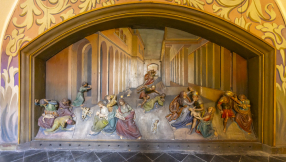
The Old Testament gives us many men and women of faith from whom we can learn valuable lessons from. One such man, Nehemiah, was a remarkable man who can teach us very important lessons we need to apply in our own lives.
Who is he and what can we learn from him?
A man who cried out to God
Nehemiah was no preacher or pastor. In fact, he wasn't even in church. Nehemiah was a Jewish cupbearer to a king named Artaxerxes, who reigned from the city of Susa in what is today's Iran. We would naturally assume that because he held a high position as the king's own cupbearer, he would be comfortable where he is.
But he isn't.
The book of Nehemiah opens with the account of Nehemiah receiving a report about Jerusalem's distress: that its walls are broken and its gates are on fire. Instead of shrugging it off, Nehemiah weeps for his people and cries out to God for mercy.
Nehemiah acquires the king's favor, and goes to Jerusalem with the king's letters giving him safe passage and resources from the king's forest. (see Nehemiah 2:1-10)
A man who served
Despite coming home to Jerusalem as its provincial governor, Nehemiah chose to identify with his people who were suffering. Nehemiah was involved in the work of rebuilding Jerusalem's walls. He surveyed it himself and personally spoke to the people about the plan to rebuild it (see Nehemiah 2:11-18). And when certain people came to oppose the work, he didn't abandon it; he remained focused on rebuilding the walls. (see Nehemiah 4, 6)
Nehemiah also fought against the oppression happening among the Jews. He commanded other officials and nobles to forgive outstanding debts and return lands acquired through taxes to the people. (see Nehemiah 5:1-13)
And despite being governor, Nehemiah didn't take advantage of the provisions allotted for him. Unlike previous governors who burdened the people, Nehemiah didn't in the feat of God (see Nehemiah 5:15). He did not place a heavy burden on the people.
A man who used his position to bring people to the Lord
After finishing the walls, Nehemiah continued to do what was right in the sight of God. He gathered the people and listed them according to genealogy (see Nehemiah 7), and then later had God's word read to them by Ezra the priest (see Nehemiah 8).
Nehemiah wasn't content to see the walls repaired. He wasn't contented to see the people of Israel come home to their own land. Along with Ezra the priest, Nehemiah worked to bring people back to the Lord:
"And Nehemiah, who was the governor, Ezra the priest and scribe, and the Levites who taught the people said to all the people, "This day is holy to the Lord your God; do not mourn nor weep." For all the people wept, when they heard the words of the Law." (Nehemiah 8:9)
Lessons to learn from Nehemiah
Nehemiah wasn't a priest or preacher, but God used him mightily during his time. His life teaches us many things that we should learn, and here are but a few of them:
1) The fear of God is necessary for compassion
We read that what Nehemiah did to the people and for the people was because he feared the Lord. He did not abuse his authority and commanded that debts be canceled and lands be returned so the people may have food.
2) Anybody can serve God well
If Nehemiah, a cupbearer, can serve God in such a great capacity, who are we to think that only preachers or ministers of the word can serve Him? Whatever gift or area of expertise we have can be used for God's glory, as long as it is used according to His ways.
3) Earthly positions should be used for God's glory
Nehemiah was a governor who used his position and authority to bring God's people back to Him. Such is the same for us: we should use our positions of influence to bring man back to God.













